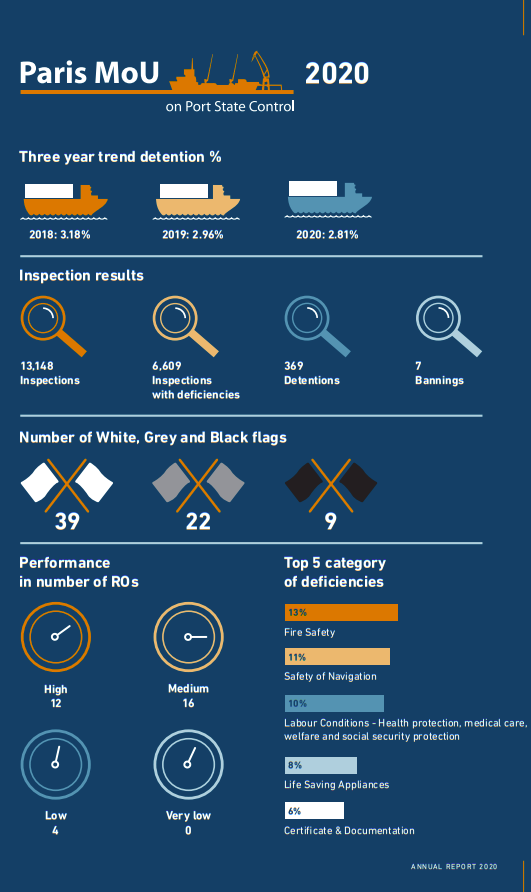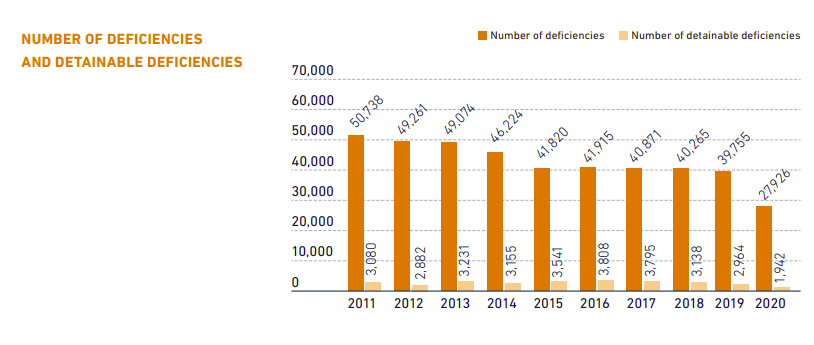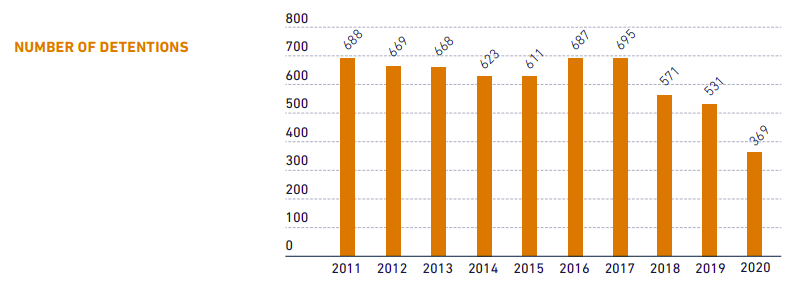The Paris MoU issued its annual PSC report recording a 27% decrease in the number of inspections in 2020: from almost 18,000 in recent years to 13,148. The detention percentage of 2.81% has decreased only slightly (2.96% in 2019) but the number of detentions has decreased significantly from 531 in 2019 to 369 in 2020.
During 2020, Paris MoU had to scale back efforts, resulting in decreasing numbers of inspections, bannings, detentions and deficiencies. In 2020, 7 bans were issued, a decrease compared to 2019 when 27 bans were issued. The number of detainable deficiencies decreased to 1,942 (from 2,964 in 2019).
In the past three years, 55 ships have been banned for multiple detentions, 5 ships were banned “failing to call at an indicated repair yard” and two ships for jumping detention. In the same period, 12 ships were banned for a second time (13 in the period 2017 to 2019).
[smlsubform prepend=”GET THE SAFETY4SEA IN YOUR INBOX!” showname=false emailtxt=”” emailholder=”Enter your email address” showsubmit=true submittxt=”Submit” jsthanks=false thankyou=”Thank you for subscribing to our mailing list”]
Over a three-year period, the flags of Comoros, the Republic of Moldova, the United Republic of Tanzania and Togo have recorded the highest number of bannings. Looking at the Paris MoU “White, Grey and Black List” in this challenging year, a small shift is noticeable in the quality of shipping resulting in a larger “Grey List”. The total number of 39 flags on the “White List” is slightly less than that of 2019 (41). The “Grey List” contains 22 flags (16 in 2019); the “Black List” 9 flags (13 in 2019).
The number of inspections has clearly decreased significantly in 2020; 13,148. However, the detention percentage in 2020 (2.81%) has only decreased slightly from 2.96%. The number of detainable deficiencies has also decreased from 2,964 in 2019 to 1,942 this year. Members with the largest number of inspections, namely Spain, Italy, Canada, the UK, Greece, France and the Russian Federation, jointly accounted for 51% of the total number of inspections this year.
With 545 inspections and 41 detentions, the ships flying a “Black-listed flag” had a detention rate of 9.36%, which is less than the 12% in 2019. For ships flying a “Grey-listed flag” the detention rate was 4.6%, which is less than the 7% in 2019. Ships flying a “White-listed flag” had a detention rate of 2.4% which is slightly higher than in 2019 (2.2%) and 2018 (2.3%).
The five most frequently recorded deficiencies in 2020 were “ISM” (4.65%, 1,298), “fire doors/openings in fire-resisting divisions” (3.07%, 857), “seafarers’ employment agreement” (1.9%, 530), “cleanliness of engine room” (1.43%, 400) and “nautical publications” (1.36%, 381).
The deficiency on the seafarers’ employment agreement increased relatively from 1.2% to 1.9%. The highest increase of the most frequently recorded deficiencies. In addition, the total number of the top five of deficiencies has relatively increased from 11.2% in 2019 to 12.4% this year.

Ship inspections
The total number of inspections carried out in 2020 is 13,148. A substantial decrease compared to the numbers in 2019 (17,913).
Deficiencies
- The number of deficiencies in the past 3 years was 40,265 (2018), 39,755 (2019) and 27,926 (2020) respectively.
- The percentage of inspections carried out with one or more deficiencies recorded decreased slightly over the three-year period to 50%; against 52% in previous years.
- The average number of deficiencies per inspection of 2.1 is comparable to that in 2019 (2.2).
Detainable deficiencies

- The recorded detainable deficiencies have decreased from 2,964 in 2019 to 1,942 in 2020.
Detentions
 Compared to 2019, the number of detentions has decreased significantly from 531 to 369 detentions.
Compared to 2019, the number of detentions has decreased significantly from 531 to 369 detentions.- The relative average detention rate remained at a similar level: 3.18% in 2018, 2.96% in 2019, and 2.81% this year.
- Regarding the “White, Grey and Black List” for 2020, a total number of 70 flags are listed: 39 on the “White List”, 22 on the “Grey List” and 9 on the “Black List”.
- In 2019, the total number of flag States on the list was also 70 of which 41 on the “White List”, 16 on the “Grey List” and 13 on the “Black List”.
- A graph of the distribution of listed and non-listed flags indicates that only 0.9% of the ships inspected are from flags not listed on the WGB list because the number of inspections of ships under those flags is too low to be taken into account statistically.
Ship type
In 2020 the top 4 detention rates in terms of ship types were:
- livestock carrier 11% (up from 5.3%);
- MODU (Mobile Offshore Drilling Unit) & FPSO (Floating Production, Storage and Offloading) 6.3% (was 0%);
- Passenger ship 4.5% (up from 0,7%) and
- general cargo/multipurpose ships at 4.3% (down from 5.1%).
- The general category “other” shows a percentage of 11.1% (down from 18.2%).
Refusal of access
A total of 7 ships were refused access (banned) from the Paris MoU region in 2020. 6 for multiple detentions and 1 for jumping detention. Over a period from 2018 to 2020, 12 ships have been banned for the second time after multiple detentions, resulting in a minimum banning period of 12 months. The total number of 7 bannings in 2020 decreased from 27 in 2019.
Deficiencies per main category
The number of deficiencies in the following six areas (out of the 16 areas defined) accounted for approximately 67% of the total number of deficiencies.
-Certificates & Documentation
The number of recorded deficiencies with regard to ship certificates, crew certificates and documents shows a decrease from 5,870 in 2019 to 3,969 in 2020. The relative share of the total deficiencies has only decreased from 14.7% in 2019 to 14.2% in 2020.
-Safety of Navigation
In 2020, Safety of Navigation deficiencies accounted for 11% of all deficiencies recorded. A similar percentage as in 2019. The number of deficiencies decreased from 4,362 in 2019 to 3,097 in 2020.
-Fire safety
In 2020 fire safety deficiencies accounted for 13.1% of all deficiencies recorded, the same as in 2019. In numbers, however, there is a decrease from 5,224 in 2019 to 3,661 in 2020.
-Pollution prevention
The total number of deficiencies recorded in the different pollution prevention areas in 2020 was 1,865. This is a decrease compared to 2019; 2,676. The share of deficiencies in the different pollution prevention areas compared to the total number of deficiencies was 6.7% in both 2019 and 2020.
-Working and living conditions
Most of the deficiencies in the field of working and living conditions (MLC,2006, areas as mentioned in the table on page 46 have been found in the following areas:
- Health and safety and accident prevention (area 11) 2,569 (44% of all MLC deficiencies);
- food and catering (area 10) 1,035 (17%);
- seafarer’s employment agreements (area 4) 645 (10.7%) deficiencies;
- accommodation (area 8), 484 (8%);
- hours of work and rest (area 6) 446 (7.4%).
The percentage of deficiencies regarding working and living conditions, related to the total of deficiencies is 21.5%. An increase from 19% in 2019. The total number of MLC deficiencies in 2020 was 6,012, a small decrease from 6,253 in 2019. Regarding specific deficiencies (as part of the distinct areas) an increase was seen in the deficiency of SEAs where other deficiencies in the top five decreased. The increase shows 484 (relative 6.4%) in 2019, 530 in 2020 (8.8%). The difference was also particularly visible in the detainable deficiencies where an increase is shown from 43 in 2019 (relative 11.8%) to 79 in 2020 (relative 26.2%).
In relation to the total recorded deficiencies regarding all relevant instruments of the Paris MoU, the SEA percentage increased from 1.2% to 1.9%.
-Safety Management
The number of ISM-related deficiencies has decreased to 1,298 in 2020. In 2019, this was 1,782 deficiencies, compared to 1,906 in 2018. The percentage related to the total deficiencies has increased from 4.4% in 2019 to 4.6% in 2020.






























































